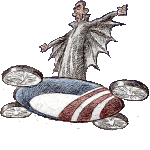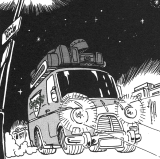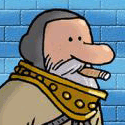|
Ah, fair enough! (To toot my own horn What Ho, World! is at the least PbtA-inspired, though it's pretty far removed from core AW. It's similarly in a pre-release state though so probably shouldn't go up on the page yet!)
|
|
|
|

|
| # ? May 14, 2024 20:24 |
|
I'm aware we have a lot of AW hackers here, so: What's your process? How do you start from "I have this concept for a game" and get to Fellowship or Masks?
|
|
|
|
The key elements in a PBTA hack are the basic moves, the playbooks, and the GM moves/agenda/principles. When I wrote Pigsmoke I started by writing basic moves that covered everything I expected academic wizards to get up to. Then I knocked out six playbooks to cover the six departments, giving them special abilities related to their magic, and largely copied the GM stuff from Apoc World but tweaking it as I went through to match the genre I was working in. That becomes the basic framework, and you add extra bits to reinforce what you've started building. If you keep testing the game, or have other people read it, you'll quickly find the spaces where they expect to have mechanical support but don't. Then you put something in there and try to tie it in with everything else. For example, a lot of the moves in Pigsmoke v1 had a cost that they 'took a long time' or similar, so I (eventually) created a time-consuming tag and hung a rules framework on it to cover the passing of time. That bit of design emerged as a necessity from the design that had already happened. Then you just keep expanding the game until it's finished.
|
|
|
|
To add to that, never be afraid to cut something that isn't working out. The thing that makes PbtA work is having a tightly focused game, that gives you rules to do exactly what's worth doing and little else. It is important to embellish and add on to what works and what ends up mattering, but it is far MORE important to remove anything that doesn't fit the theme you're going for. Otherwise you get those games like Tremulus, or that one survival games hack with 25 basic moves. One of the biggest red flags for a bad hack is if they copy Apocalypse World's Harm Clock exactly as it is, because the AW Harm Clock is meant to represent how flesh wounds just kinda happen, but once someone is seriously hurt, it takes a miracle to save them. That works great in the apocalypse. It does not fit or work in almost any other genre out there, but people keep it because hey, its easy and it works. But half the dang health bar is "you're going to die!" There are some exceptions, but for the most part, the Harm Clock rarely helps the theme of other PbtA games, because very few genres are as hyper-lethal as AW is supposed to be. gnome7 fucked around with this message at 11:57 on Sep 24, 2016 |
|
|
|
I really hate the clocks in general. Just the way they are presented in aw is really unintuitive, compared to like a simple tracker.
|
|
|
|
ShineDog posted:I really hate the clocks in general. Just the way they are presented in aw is really unintuitive, compared to like a simple tracker. It took me an embarrassingly long time to realise I had to colour in the smaller sections one at a time rather than going "one quarter, two quarter, three quarter, full".
|
|
|
|
spectralent posted:I'm aware we have a lot of AW hackers here, so: What's your process? How do you start from "I have this concept for a game" and get to Fellowship or Masks? For Hollyworld, it was "What are the stories about LA? Who stars in them?" From there, it was easy to delineate Role and Status (which was inspired by Spirit of 77, I'm sure.) After that, most of the moves came through playtesting; when I realized there was no "Wheel and Deal" mechanic, I had to create it, and that became core. The biggest difficulty is that good GMs for the game will need a lot more knowledge than normal; the genre pieces the game inspired are typically movies or limited run TV shows, which have fewer protagonists and shorter lengths. But again: Playtesting.
|
|
|
|
spectralent posted:I'm aware we have a lot of AW hackers here, so: What's your process? How do you start from "I have this concept for a game" and get to Fellowship or Masks? A good thing to keep in mind when writing moves, especially basic ones, is "what does this incentivize?" Any player is going to have goals, and accomplishing those means gaining power -- experience, leverage over NPCs, positioning, etc. The moves you right are the tools she has to do those things. So, what is she encouraged to do to exploit those tools? What are other people (PCs mostly, but also NPCs) pushed to do in response? And what are the possible results? Then you make sure that those behaviors and results are things you want to happen, fictionally. For instance, consider MH's turn on move: quote:When you turn someone on, roll with hot. On a 10 up, take a String against them. Strings are super important; if you have strings on someone it helps you control them, beat them up, pretty much anything. So naturally you want as many strings as possible, on as many people as possible. But the primary method of gaining them is this move here. So, in order to accomplish that natural goal, you're encouraged to hit on everyone else, all the time, even -- perhaps especially -- if you don't actually like them. In fact, if you're planning to betray them, murder them, etc., you should probably prepare for it by... hitting on them. Instant recipe for messy teenage relationships, especially if the MC makes sure that your illicit flirtations get seen and misinterpreted by others... which she absolutely will, at the slightest opportunity, since one of the MC hard moves is expose a dangerous secret to the wrong person. From the other side, if someone is using this move on you, how can you respond? Well, you can turn them on right back, and get a string to counter theirs. Or you could shut them down, hopefully erasing the string they just took -- give them the cold shoulder, insult them, be horrible and petty. Or, if they roll 7-9, you can give yourself or make a promise (and notice the wording on the promise: you don't offer something they want, you offer something that you think they want). So we've got steamy make-outs, betrayal and backstabbing, sex, and misguided attempts to guess what other people want. All things we, the designer, want to see.
|
|
|
|
What did people end up thinking of city of mist in the end? Sorry, mist, fuckin mist. ShineDog fucked around with this message at 22:48 on Sep 27, 2016 |
|
|
|
I'm having a design dilemma in my PBTA hack. It's a game about a small crew of misfits who owe 2,500,000 space bux to the wrong kinds of people, and have to fly their lovely spaceship around taking odd, dangerous, and probably illegal jobs and mission to try and earn enough money to stay afloat and maybe buy some cool stuff every now and then. The moment to moment feel of the game is emulating Sci-fi space opera TV shows like Firefly, Farscape, Andromeda, Killjoys, and Dark Matter. The dilemma I'm having is how I should model money. The existing method is a literal representation. You get paid 10,000 to 50,000 guilders for completing a job or shipping goods or buying and selling goods etc. depending on the value or danger involved. You need to pay 50,000 guilders every 20 days to keep your debtors from showing up to break your legs or otherwise mess with you. Everything you can spend money on has a concrete price set for it. My dilemma is, does having this side of the game be so literal and making the players count their money and juggle finances add to the experience or detract from it? Would the game be better served by abstracting your payments to a roll when you get paid or when you go to fork out for expenses? I like the idea of keeping them poor, but giving them opportunities to gain fictional benefits that represent them blowing their paydays. Would abstracting money to situations better suit the game's themes, or is counting money going to make debt feel more weighty?
|
|
|
|
You might eyeball, at least for how you handle the jobs and assignments and the like in general, The Sprawl--it has two moves for missions that I think are downright brilliant and probably some of my favorite PBtA mechanics in practice and play (my groups have had a blast, at least!) and an interesting take on wealth and reputation. Get the Job When you negotiate the terms of a job, roll Edge. (Edge being one of the main attributes for a playbook0 10+: choose 3 from the list below 7-9: choose 1 from the list below
In The Sprawl, (intel) and (gear) are both abstracted resources that you can spend on the fly during a mission when either would be helpful. For example, you might pop intel you have to declare that you'd received a set of credential / passwords, or you might pop gear to reveal that you were prepared with a suitable disguise, etc. The Sprawl abstracts wealth as 'cred' which also doubles as your street cred / reputation (being a cyberpunk game) but perhaps you might find a similar concept workable for your game with some tinkering. In the Sprawl when you take on a job you stake your cred (both money and reputation) on its completion--and from there, the job either pays poorly, normally, or well, typically. You can stake 1, 2 or 3 cred at a maximum on a given mission--and as an added wrinkle, for each character that decides to stake 3 cred, the MC is supposed to make the mission exponentially more difficult (there's some purposeful interplay in the Sprawl that characters may sometimes be out for themselves.) If a job pays poorly, you get 1 to 1 on cred (this is typically the result of somebody with the characters under their thumb screwing them on a job or forcing them to take it) normally they get a x2 return on their staked cred if successful, and if it pays well a x3 return. Along the way, they might find additional side opportunities for cash like pay data or valuables. Getting Paid When you go to a meet to get paid by your employer, roll and add the number of unfilled segments on the Legwork Clock. 10+: choose 3 from the list below 7-9: choose 1 from the list below
The Sprawl handles missions in Legwork and then Action phases, with Legwork being preparations, Action being the actual execution of the system. This may or may not give you inspiration for your particular take on things, but I found it interesting and worth noting because it's a clever way of demonstrating that if the characters do a good job of handling a mission, they improve their odds of actually getting paid as expected, etc. Like many good moves for PBtA games, for both of these obviously the options not chosen by players invite interesting consequences and obstacles to arise by their omission. A number of the playbooks also have moves that purposefully influence get the job / get paid in particular, which you might or might not find to be fun design space. As for your specific debtor concept, a final note: in the Sprawl, once a character accumulates enough 'cred' they can take a playbook advance that is, essentially, 'retire safely'--so you might possible consider something like that if you want this debtor situation to be a little more abstracted / malleable as characters come and go. Hope this helps with some inspiration!
|
|
|
|
madadric posted:I'm having a design dilemma in my PBTA hack. I've never really had fun stopping my fantasy romp to play fantasy accountant. I'd stick with the barter system used by most PBTA games. For instance you can get moves like: When you try to replenish your ship's stores while in port, spend a barter and roll 2d6 + each additional barter spent: On a 7-9, pick one. You find a lead on a good gig. There aren't any hidden problems with the goods you buy. You don't attract unwanted attention from the locals. On a 10+. pick two.
|
|
|
|
I think it really depends on how much you want to push the economic horror, "the legbreakers are coming" feeling. Even then, it seems like it might be something you can make more abstract and still keep that feeling -- if the important thing is that you need 5X cash when the rent comes due and jobs pay 1-5X cash per, it's kind of moot whether X is 1 barter or 10000 spacebux. The only advantage I can see to bigger numbers is allowing more granularity in purchasing, if you want that. I don't know a lot about it myself, but you may want to look into a game called Red Markets -- not PbtA, but heavily focused on economics and debt as a driving force in the adventuring economy. Antivehicular fucked around with this message at 16:16 on Sep 28, 2016 |
|
|
|
To advocate for the 'track exact spacebucks' side, if the primary driving focus of the game is looming impending debt collection and the hunt to make ends meet, tracking exact monetary values or at least calling units of barter something like '1000 guilders' instead of '1-barter' will really add to the themes of the game. If money is the primary focus, you should write the game so that the players treat it as money. If you end up with the players sitting around a scribbled sheet of paper full of crossed out figures going "jesus christ that motherfucker overcharged us for the plasma drive repairs and now we're 2000 guilders short where the gently caress are we gonna get two large in four hours" then imo the game's working as intended.
|
|
|
|
Also while we're on the subject of stealing from The Sprawl, it has a nifty idea in that the move Get Paid is not dependent on stats of any of the characters, but on the state of the Legwork Clock (the clock which measures how much attention you had managed to attract while preparing for the mission). You might, for example, have a move in your game that allows the players to dodge the consequences of failing to pay back their debts, and have it scale with how much they need to make up the difference. Like so: quote:When you come up short when the collectors arrive, roll +amount of $currency you're lacking. On a 7-9, pick* 1. On a 10+, pick 3. *alternatively, "The GM picks." **note how the seizure is not said to be fair. Tevery Best fucked around with this message at 13:25 on Sep 29, 2016 |
|
|
|
Speaking of hacking, I've been scribbling notes for a hack myself for a few days now, specifically for small-town conspiracies; Wicker Man, Lovecraftian stories where there's creepy isolated towns, When They Cry, even, to a degree, Hot Fuzz. The general premise being that the players are stuck in a place where something's going on behind the scenes and are looking to figure it out. The big issue is that this isn't quite the mould that games in the PBTA mould usually get built on; for one, a lot of PBTA games assume the PCs are familiar with their settings and environment, which is obviously tricky. The second big issue I'm struggling with is how to dole out clues. At present I'm working with a workshop like move, i.e. say what you're investigating, get told what to do, and if/when you do you you find out what's up with that, but I'm wondering if A: That's too boring and B: If it could be clearer. I was considering changing the wording so that it functions as a flat true/false test on something, but that might be tricky, especially with the fuzzy nature of the supernatural I'm trying to encourage.
|
|
|
|
spectralent posted:Speaking of hacking, I've been scribbling notes for a hack myself for a few days now, specifically for small-town conspiracies; Wicker Man, Lovecraftian stories where there's creepy isolated towns, When They Cry, even, to a degree, Hot Fuzz. The general premise being that the players are stuck in a place where something's going on behind the scenes and are looking to figure it out. The big issue is that this isn't quite the mould that games in the PBTA mould usually get built on; for one, a lot of PBTA games assume the PCs are familiar with their settings and environment, which is obviously tricky. I could see this working with A. Make it so setting knowledge is not inherent (yeah duh) B. Center things around an expanded Spout Lore style move. The purpose being that there is now a mechanical frame work for literally asking you about a thing and then rolling to see how that thing plays out. There's a hack frgbrgr (?) is working on where the stats are emotion based and the read a sitch move allows different questions based on which emotion you rolled that you might check out for this.
|
|
|
|
I don't really have direct advice, but if you're not sure that it will fit in the PBTA framework...maybe examine if it's really the right basis for this hack? Not everything is going to gel well with PBTA.
|
|
|
|
Error 404 posted:I could see this working with The main thing I am concerned with there is doing the thing where you have to roll to find clues and bad rolls shut off avenues of investigation.
|
|
|
|
spectralent posted:The main thing I am concerned with there is doing the thing where you have to roll to find clues and bad rolls shut off avenues of investigation. This is a fair point, and probably the main angle for changing the move to fit your game specifically. I just think that mechanically 'ask the gm what my character knows' is a fair basic move for a mystery game Maybe it runs on clues. Do x thing to get clues in game, when you have clues roll +clues spent 10+ a big secret and how best to use it 7-9 a secret, but you gotta work out how it fits for yourself 6- you learn a secret, but it leads to more questions/ complicates things/ comes with nasty strings attached
|
|
|
|
Fiigured I would ask in here since there is no dedicated Masks thread- I am going to be GMing my first game of a pbta system (Masks) next week. I am having trouble making sense out of the statement that Giving my npc villain more conditions increases their longevity when they also say that a villain is defeated when they need to mark a condition but they are filled in. Wouldn't having more conditions move them closer to the limit?
|
|
|
|
Twibbit posted:Fiigured I would ask in here since there is no dedicated Masks thread- I am going to be GMing my first game of a pbta system (Masks) next week. I am having trouble making sense out of the statement that Giving my npc villain more conditions increases their longevity when they also say that a villain is defeated when they need to mark a condition but they are filled in. Wouldn't having more conditions move them closer to the limit? Villians don't have all of the conditions PC's do. You pick one to five, depending on how powerful or important they are. So, if you have three conditions, you can only take four hits. The first three fill up your conditions, and the fourth knocks you out. If your have five conditions, you can take six hits. The first five hits fill up your conditions, and the sixth knocks you out.
|
|
|
|
Capfalcon posted:Villians don't have all of the conditions PC's do. You pick one to five, depending on how powerful or important they are. So, if you have three conditions, you can only take four hits. The first three fill up your conditions, and the fourth knocks you out. Ok so I choose the conditions they are ABLE to get, that is poorly worded in there. Thank you very much!
|
|
|
|
So one of those moves where I wonder if this needs to be a thing, or if it should just happen, for the Harrison Ford style adventurer class.quote:Shoots first
|
|
|
|
spectralent posted:The main thing I am concerned with there is doing the thing where you have to roll to find clues and bad rolls shut off avenues of investigation. Check out "Black Stars Rise" and "Lovecraftesque", I've enjoyed how both of those games work with the "find the clues" system of gaming. Basically clues come up as necessary to help support the fiction, so you don't end up in a dead-end of "well poo poo now what?"
|
|
|
|
ShineDog posted:So one of those moves where I wonder if this needs to be a thing, or if it should just happen, for the Harrison Ford style adventurer class. It's too powerful since the wibbly-wobbliness of narration makes it an always usable get-out-of-jail-free card. Make it a roll at the least.
|
|
|
|
rumble in the bunghole posted:It's too powerful since the wibbly-wobbliness of narration makes it an always usable get-out-of-jail-free card. Make it a roll at the least. quote:Shoots first ? Advantage being 3 dice pick 2, taken from Spirit of 77 specifically but appearing in a bunch. A bit less powerful and more specifically worded. Also I'm in this horrible part of the hack where things that seemed like good ideas seem like bad ideas, the replacements don't fint with things built around the original ideas, and it's all falling in on itself. ShineDog fucked around with this message at 22:30 on Sep 30, 2016 |
|
|
|
Advantage makes sense.
|
|
|
|
I've already got way too many half started projects, but thinking about MASHED and the idea of games focused on dangerous, dramatic professions, I kind of want to make a well researched and serious PBTA hack about crab fishermen in Washington state, just to call it Dungeness World
|
|
|
|
spectralent posted:The main thing I am concerned with there is doing the thing where you have to roll to find clues and bad rolls shut off avenues of investigation. If finding a clue is based on the roll, you have a few options. First of all, you always find a clue, no matter the outcome of the roll. That's never in question. So what are the stakes? Option 1: What finding the clue costs you? What pressure is applied to the PCs? Write a list of common pressures when looking for the clue: More obstacles get put in the way, someone or something coming after the PCs get closer, a PC suffers injury or stress, someone the PCs are close to is injured or killed, countdown to some big awful climax advances. This is an opportunity to use up their resources. Option 2: Where does the clue lead, and how bad is it? This affects the nature of the clue itself. Does the clue lead to a relatively danger-free investigation avenue well suited to a PCs strengths, or to a dangerous situation that exploits a PCs weakness? Does the clue call into question something the PCs considered reliable up until now, and twist the case on its head? The option you pursue may depend on whether the case is written/generated before you start playing, or while you start playing. I prefer methods where even the GM is playing to discover the mystery, there's a number of valid leads, but only one turns out to be legit. ShineDog posted:So one of those moves where I wonder if this needs to be a thing, or if it should just happen, for the Harrison Ford style adventurer class. try this: quote:
Now, because moves are prescriptive and descriptive, this may be played against the player's best interests. "She's distraught, and pushes you back, Luke, she's holding your pistol, and raising it at you, Han. It's crazy, everyone's shouting, she's letting out this angry, despairing wail and the gun in her hands is shaking." "Tears are streaming down her face as she cocks the pistol. You have Shoot First, right? Because she wants to make you kill her." "...poo poo." madadric fucked around with this message at 16:17 on Oct 1, 2016 |
|
|
|
On clue talk, the clue finding move in my PbtA game Malleus is currently as follows: Look Around When you look around for clues or information, roll +Reason. On a 10+ all three, on a 7-9 choose two: Ľ You find information, evidence, an item, or an object that is useful or valuable. Ľ You uncover any present threats. Ľ You donít put yourself in immediate peril. So far it has been working well, but the proviso is that even on a miss they should normally get a clue - things just get real bad for the character. Also, "you find no evidence here that relates to your investigation" counts as useful information so long as it's clearly true. Edit: Also, Malleus is based more around thrillers than mysteries, hence the consequences for getting information being also finding danger.
|
|
|
|
Would you use that to investigate a person?
|
|
|
|
ShineDog posted:Would you use that to investigate a person? You could, but I feel the stakes are different enough to have its own move. Interrogate When you interrogate a suspect or witness, roll+X. On S 10+, they're informed and co-operative, or you trick them into giving away more than they intended, and you get the information you were looking for. On a 7-9, you get some info, but it's vague and you need to get a little rough, leading them injured or distraught. On a 6-, either you need to beat the info out of them or they stonewall you.
|
|
|
|
ShineDog posted:Would you use that to investigate a person? Malleus uses a pretty standard Read a Person type move as well (it also has a Read a Situation move, and another one for recalling lore about the supernatural, it might well have too many information relate moves). Edit: That said, Look Around would apply if you were asking around for information, or just hitting up a contact for info. thefakenews fucked around with this message at 14:36 on Oct 2, 2016 |
|
|
|
 I've just released a new supplement for Legacy: Life Among the Ruins! Mirrors in the Ruins is all about changing your perspective: instead of playing families of survivors, you're playing one of the inhuman groups that were created by - or created - the apocalypse. The book contains playbooks for robot hives, alien invaders, aquatic raiders and uplifted animals, and compliments this more antagonistic tone with rules for subterfuge and conspiracy and grand projects Families can build over generations that permanently reshape the Wasteland. This book was the brainchild of a Legacy fan who pitched it to me when I had no plans for further Legacy material, and I think it really carves out a space for itself. We're now hard at work putting together ideas for a revised edition of Legacy: if you played or read the game and ran into issues, please do get in touch! Flavivirus fucked around with this message at 16:39 on Oct 5, 2016 |
|
|
|
Alright, I've immediately bought that because that concept rules, and absolutely adds something that I didn't realize was missing from the original game until I read this post. I definitely want to play as robots or aliens, and I know a lot of people who would love to be uplifted animals.
|
|
|
|
Reskin robot hive to be uplifted squirrels. That owns
|
|
|
|
Thanks! I had the same reaction when Douglas sent me his pitch for the book - playing the 'monsters' and showing how they're trying to adapt to this new world too fits in really well with the humanist vibe I tried to put into Legacy. Hopefully the book's actual content is to your liking! Though humanist may be the wrong word when applied to aliens and robots alongside homo sapiens...
|
|
|
|
So... ...let's say I'm thinking about writing a new version of the Dungeon World Guide, designed to cover PbtA in general as opposed to just DW. Assuming I get off my rear end and finish this no promises at all I am a lazy gently caress, what kinds of things do people feel should be included/expanded on this time around? What was missing that would have helped ages ago? What's some non-DW-specific stuff that should be discussed?
|
|
|
|

|
| # ? May 14, 2024 20:24 |
|
I've released version 3.0 of Impulse Drive. It's abstracted time and money, helping the game to flow more like a TV space opera, and concentrate the acquisition and expenditure of money on the fictional outcomes. There's new Crew ships in there, and a lot of new upgrades for ships. i'm intending this version of the rules to be stable for a while, and only fix spelling and grammar issues.  Impulse Drive You got your ship, you got your crew, you got a lot of debt. A game all about being a band of freelancers sailing across the galaxy, this game can just as easily be Firefly and Dark Heresy as it can be a Star Wars: Rebels season one or Mass Effect. You may have some big goal or its all a search for more money, but you will encourage strange alien oddities, overcome tough opposition, and try your best to survivor in the middle of the endless void known as space.
|
|
|





























